

School Librarians, is no-one listening? How to help schools understand our role. Why school librarians matter: What years of research tell us - kappanonline.org. When schools have high-quality library programs and librarians who share their expertise with the entire school community, student achievement gets a boost.
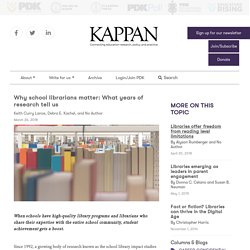
Since 1992, a growing body of research known as the school library impact studies has consistently shown positive correlations between high-quality library programs and student achievement (Gretes, 2013; Scholastic, 2016). Data from more than 34 statewide studies suggest that students tend to earn better standardized test scores in schools that have strong library programs. Further, when administrators, teachers, and librarians themselves rated the importance and frequency of various library practices associated with student learning, their ratings correlated with student test scores, further substantiating claims of libraries’ benefits. Skeptics might assume that these benefits are associated mainly with wealthier schools, where well-resourced libraries serve affluent students.
Don't overlook your school librarian, they're the unsung heroes of literacy. When talking about teaching and learning, most people don’t immediately think of librarians.
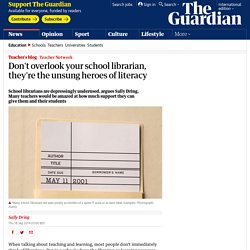
But in a school where the librarian or learning resource centre manager is valued and properly made use of, we can teach important skills. Librarians are in the privileged position of being able to work with teachers across all subjects and students of all ages, observing the inner workings of a school from a slight distance. One thing I’ve noticed is that the belief that students are adept at using the latest technology to find the information they need is simply not true. Students turn up in the library with the ubiquitous task of researching a topic and they don’t know where to start. Usually they head to Google, which takes them straight to Wikipedia (it’s top of the list so it doesn’t take much effort). Teachers are busy enough as it is and often don’t have the time to critically assess all the sources of information out there. Ten easy tips to be a library rockstar.
Gwyneth Jones, a teacher librarian based in the USA, shares ten tips to brand yourself as a library rockstar.
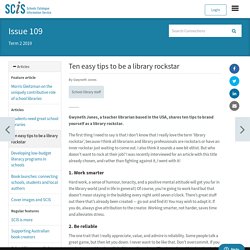
The first thing I need to say is that I don’t know that I really love the term ‘library rockstar’, because I think all librarians and library professionals are rockstars or have an inner rockstar just waiting to come out. I also think it sounds a wee bit elitist. But who doesn’t want to rock at their job? I was recently interviewed for an article with this title already chosen, and rather than fighting against it, I went with it! 1. Hard work, a sense of humour, tenacity, and a positive mental attitude will get you far in the library world (and in life in general!)
2. Why school librarians matter: What years of research tell us - kappanonline.org. Research Confirms Value of School Librarians. This Library Takes an Indigenous Approach to Categorizing Books by Sydney Worth. For more than a century, the Dewey Decimal Classification system has dictated the way libraries organize their collections.
And the way they organize and sort information says a lot about what kind of information is prioritized—and what’s left out. Books on Indigenous communities often get looped into the history section. As a result, information on Native peoples literally gets left in the past. X̱wi7x̱wa Library (pronounced whei-wha) at the University of British Columbia in Vancouver, Canada, is working to change that. The library aims to counter Western, colonial bias and better reflect the knowledge of Indigenous peoples. Amy Parent, a 2014 graduate of UBC and member of the Nisga'a Nation, used X̱wi7x̱wa to conduct research as a graduate student studying Indigenous education. “They are very much aligned with the way we form relationships with our communities,” Parent said. For Indigenous visitors, it’s a safe space. Ten ways to advocate for your role as a teacher librarian. You can offer to support the program with physical resources, curated website collections, core text suggestions, research skills that you can teach — the opportunities are endless.
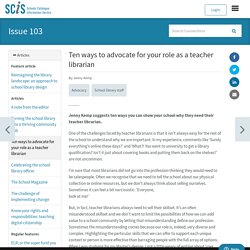
Your broad knowledge of learning across the school can contribute to curriculum mapping, connecting the work of individual subjects to facilitate interdisciplinary teaching opportunities. 5. Gain support from leadership You can find a supporter among the school leadership team who understands your vision to improve student outcomes across the school. You don’t need to always do all the advocating yourself; you can ask them to assist you in advocating for the role of the library in the school. 6.
You can teach. Why school librarians matter: What years of research tell us - kappanonline.org. When schools have high-quality library programs and librarians who share their expertise with the entire school community, student achievement gets a boost. Since 1992, a growing body of research known as the school library impact studies has consistently shown positive correlations between high-quality library programs and student achievement (Gretes, 2013; Scholastic, 2016).
Data from more than 34 statewide studies suggest that students tend to earn better standardized test scores in schools that have strong library programs. Further, when administrators, teachers, and librarians themselves rated the importance and frequency of various library practices associated with student learning, their ratings correlated with student test scores, further substantiating claims of libraries’ benefits. Skeptics might assume that these benefits are associated mainly with wealthier schools, where well-resourced libraries serve affluent students. Librarians and student achievement References DEBRA E. School Library Journal. Visionary school leaders and superintendents are reinventing school libraries, highlighting their key role in student learning and literacy.
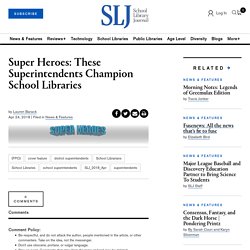
From left: Superintendents Warren Drake and Pam MoranFrom Left: Photo courtesy of East Baton Rouge Parish School System; photo by Cale Elem librarian Anna Balasz Thomas S. Woods-Tucker vividly remembers his high school’s media center in Cotton Plant, AR. He would pore over the Arkansas Democrat and the Arkansas Gazette and spend time on the first computer he’d ever seen, an IBM Tandy 1000. “I have no idea what the computer cost back then, but I am sure it was a lot,” he says. 10 Reasons Librarians Are More Important Than Ever. It's National Library Week, and we couldn't resist paying homage to one of the most important members of the school community: librarians.
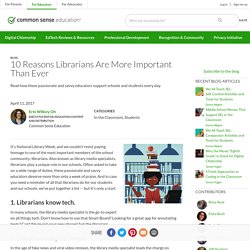
Also known as library media specialists, librarians play a unique role in our schools. Often asked to take on a wide range of duties, these passionate and savvy educators deserve more than only a week of praise. And in case you need a reminder of all that librarians do for our students and our schools, we've put together a list -- but it's only a start. 1. Librarians know tech. In many schools, the library media specialist is the go-to expert on all things tech. 2. In the age of fake news and viral video remixes, the library media specialist leads the charge on citation, copyright and fair use, research, and news literacy. 3. Ten ways to advocate for your role as a teacher librarian.
You can offer to support the program with physical resources, curated website collections, core text suggestions, research skills that you can teach — the opportunities are endless.
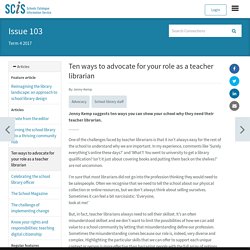
Your broad knowledge of learning across the school can contribute to curriculum mapping, connecting the work of individual subjects to facilitate interdisciplinary teaching opportunities. 5. Gain support from leadership You can find a supporter among the school leadership team who understands your vision to improve student outcomes across the school. What Exactly Does a Librarian Do? Everything. Growing up, I liked to imagine what it would be like to work in a library.
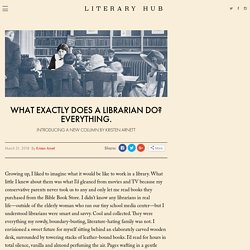
What little I knew about them was what I’d gleaned from movies and TV because my conservative parents never took us to any and only let me read books they purchased from the Bible Book Store. I didn’t know any librarians in real life—outside of the elderly woman who ran our tiny school media center—but I understood librarians were smart and savvy. Cool and collected. They were everything my rowdy, boundary-busting, literature-hating family was not. I envisioned a sweet future for myself sitting behind an elaborately carved wooden desk, surrounded by towering stacks of leather-bound books. I cling to these happy memories whenever somebody breaks the copy machine for the fourth time that day by jamming a ballpoint pen inside the feed tray. School Librarians' Knowledge: What We Bring to the Curricular Table. Twenty-first century school librarians are both heirs and path-breakers.
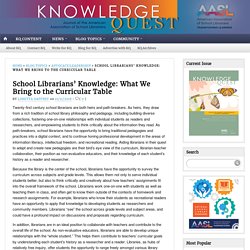
As heirs, they draw from a rich tradition of school library philosophy and pedagogy, including building diverse collections, fostering one-on-one relationships with individual students as readers and researchers, and empowering students to think critically about the information they read. As path-breakers, school librarians have the opportunity to bring traditional pedagogies and practices into a digital context, and to continue honing professional development in the areas of information literacy, intellectual freedom, and recreational reading. Aiding librarians in their quest to adapt and create new pedagogies are their bird’s eye view of the curriculum, librarian-teacher collaboration, their position as non-evaluative educators, and their knowledge of each student’s history as a reader and researcher.
Libraries, Schools, Social Media and lots more...: Advocacy for school libraries. How we can take responsibility. After the success of my post in November 2017 Why do teachers need school librarians?
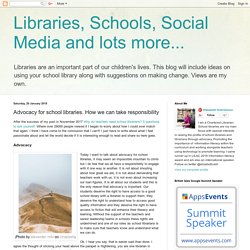
5 questions to ask yourself. Where over 29000 people viewed it I began to worry about how I could ever match that again. Why school librarians matter: What years of research tell us - kappanonline.org. 10 Reasons Librarians Are More Important Than Ever. Award-winning Durham teacher-librarian says libraries are 'powerful' DURHAM — Richard Reid’s love of libraries goes back a long way. His mom was a public librarian and growing up, he spent a lot of time at library programs. “From a young age, I saw the power of what libraries can do,” says Reid. Today, he provides support to the 130 teacher librarians working across the Durham District School Board (DDSB), as the board’s innovative education facilitator for libraries. Being a library advocate is something he’s passionate about — and that passion hasn’t gone unnoticed.
Reid was recently honoured with the Ontario Library Association’s Larry Moore Distinguished Service Award for 2018, which recognizes people who have made “an outstanding contribution to the libraries of Ontario.” “When I found out that I was winning this, I was blown away,” Reid says. As of this spring, he will be the new vice-president of the Ontario Library Association. School Libraries, Teacher Librarians and Acceleration of.
School Librarians At Their Best! – Leon's Library Blog. The last post in the current series on school libraries is by Caroline Roche, Chair of Cilip’s School Library Group. Caroline explains about the work of the group, the work they do with 2000 school librarians, and the importance of collecting reliable data for the sector to help encourage informed decision making.
7 tips for making your principal your ally. 3. Be seen outside the library. If your principal sees you on committees, attending school events, and even in the teacher’s lounge, not only can you chat informally about library matters, but you send a powerful non-verbal message as well: I am a full member of the school staff. 4. Disagree with your principal—when necessary. You may think that some of your principal’s ideas are not in the best interests of your students or staff. 5. 6. 7 tips for making your principal your ally #k12 7. It’s Not About Shelving The Books and Keeping Kids Quiet – Students Need School Libraries. Readbrightly. The Power of the Book Talk and Why School Libraries Matter. 7 Insidious Myths About Libraries and Reading (the first two kill me)